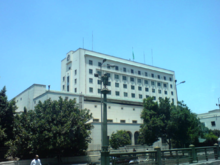This article has multiple issues. Please help improve it or discuss these issues on the talk page. (Learn how and when to remove these messages)
|

The Arab League boycott of Israel is a strategy adopted by the Arab League and its member states to boycott economic and other relations between Arabs and the Arab states and Israel and specifically stopping all trade with Israel which adds to that country's economic and military strength.[1] A secondary boycott was later imposed, to boycott non-Israeli companies that do business with Israel, and later a tertiary boycott involved the blacklisting of firms that do business with other companies that do business with Israel. An official organized boycott of the Yishuv (pre-state Jewish community in Palestine) was adopted by the Arab League in December 1945, and persisted against Israel after its establishment in 1948.[2] The boycott was designed to weaken Jewish industry in Palestine and to deter Jewish immigration to the region.[3]
Egypt (1979), the Palestinian Authority (1993), Jordan (1994), Bahrain (2020), UAE (2020), Sudan (2020) and Morocco (2020), signed peace treaties or agreements that ended their participation in the boycott of Israel. Mauritania, which never applied the boycott, established diplomatic relations with Israel in 1999, later suspended in 2009. Algeria and Tunisia do not enforce the boycott.[4] In 1994, following the Oslo Peace Accords, the Cooperation Council for the Arab States of the Gulf (GCC) states, ended their participation in the Arab boycott against Israel.[5] The move prompted a surge of investment in Israel, and resulted in the initiation of joint cooperation projects between Israel and Arab countries.[5] In 1996, the GCC states recognized that total elimination of the boycott is a necessary step for peace and economic development in the region.[4] There are still residual laws banning relations with Israel. For example, until 2021 Sudan had a law, dating back to 1958, that forbade establishing relations with Israel, and outlawed business with citizens of Israel as well as business relationships with Israeli companies or companies with Israeli interests. The law also forbade the direct or indirect import of any Israeli goods.[6][7]
While in its heyday, the Arab boycott had a moderate negative impact on Israel's economy and development but also had significant negative effect on economic welfare in participating Arab countries, as the result of a deterioration in the foreign direct investment climate in the Arab world, and reduction in the volume of trade.[5] In subsequent years and decades, the boycott was sporadically applied and ambiguously enforced, and therefore no longer has significant effect on the Israeli or Arab economies.[4] As of 2024[update], Syria and Lebanon are the only Arab states which actively enforce the primary boycott, although Iran (which is not a member of the Arab League) also enforces it as a member of the Organisation of Islamic Cooperation. Syria is the only country to continue to enforce the secondary and tertiary boycotts.[citation needed]
- ^ Turck, Nancy (April 1977). "The Arab Boycott of Israel". Foreign Affairs. 55 (3). Council on Foreign Relations: 472–493. doi:10.2307/20039682. JSTOR 20039682.
- ^ "Arab Boycott". 3 June 2016.
- ^ Horowitz, Irving Louis (2011). Culture and Civilization: Volume 2: Beyond Positivism and Historicism. Transaction Publishers. p. 91.
- ^ a b c
 This article incorporates public domain material from Arab League Boycott of Israel (PDF). Congressional Research Service.
This article incorporates public domain material from Arab League Boycott of Israel (PDF). Congressional Research Service.
- ^ a b c Joyce Shems Sharon. The Arab Boycott Against Israel and Its Unintended Impact on Arab Economic Walfare. May 2003.
- ^ "Sudan working to cancel Israel boycott law - report". The Jerusalem Post | JPost.com.
- ^ "Sudan officially annuls 63-year Israel boycott law". Times of Israel.